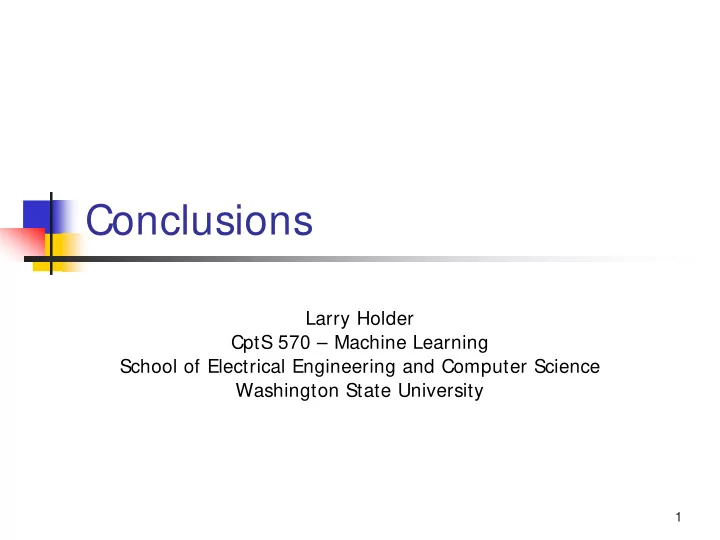

Conclusions Larry Holder CptS 570 – Machine Learning School of Electrical Engineering and Computer Science Washington State University 1
Outline � Overview of machine learning � Fundamental research issues � Grand challenge problems 2
Overview of Machine Learning � Supervised learning � Evaluation of learning methods � Learning theory � Unsupervised learning � Other learning methods � Applications � Related fields 3
Supervised Learning � Traditional methods � Version space � Candidate elimination algorithm � Decision tree induction � Neural networks � Bayesian learning � Instance-based learning 4
Supervised Learning � Advanced methods � Kernel methods � Support vector machines � Ensembles � Bagging � Boosting � Learning rule sets � Relational learning � Inductive logic programming (ILP) � Graph-based learning 5
Evaluation of Learning Methods � True error vs. sample error � Bounding true error � Comparison of hypotheses � Comparison of learners � Significance testing � ROC curves 6
Learning Theory � Bayes optimal learning � Sample complexity � PAC learning framework � VC dimension 7
Unsupervised Learning � Non-linear regression � Pattern discovery � Clustering � Grammar (language) learning � EM algorithm 8
Other Learning Methods � Genetic algorithms � Analytical learning � Reinforcement learning � Integrated learning 9
Applications � Classification and prediction � Chemical properties � Biometrics � Object recognition � Organizational and behavioral patterns � Skill acquisition � Robot navigation � Control and optimization � Heuristic search 10
Related Fields � Statistics � Pattern recognition � Control theory � Cognitive science � Psychology � Neurophysiology 11
Fundamental Research Issues � General learning methods � Limits of general methods � Theory and principles guiding development of domain-specific learning algorithms � Multi-relational learning � Learning in dynamic environments � Incorporation of domain-specific background knowledge � Ethical responsibility and privacy 12
Grand Challenge Problems � “What are the Grand Challenges for Data Mining,” SIGKDD Explorations , 8(2):70-77, 2006. � KDD 2006 conference panel � G. Piatetsky-Shapiro, C. Djeraba, L. Getoor, R. Grossman, R. Feldman, M. Zaki � GC problems define directions for the field and motivate and excite researchers � E.g., Netflix Prize 13
Good Grand Challenge Problems � Problem is hard – very difficult to solve given the current state of the art � Based on a large, publicly available data set � There is a specific goal – it is clear when the problem is solved � Problem is interesting to researchers and understandable to the public; preferably stated in one sentence � There is significant public benefit if it is solved 14
Grand Challenge Problem (1) � Automatically annotate 1000 hours of digital video in 1 hour � E.g., “basketball game”, “Michael Jordan” � General approach � Automatically extract primitive features � Manually annotate subset of videos � Learn to predict annotations based on features � Use learned classifiers to annotate subsequent videos 15
Grand Challenge Problem (2) � Functional annotation of the proteome, the set of proteins in the cell � What is the function of a protein (e.g., insulin production, metabolism)? � What other proteins does it interact with? � 100,000+ proteins, some with multiple functions � Approach: Link mining, “guilt” by association 16
Grand Challenge Problem (3) � System capable of passing SAT reading comprehension test given access to the World-Wide Web � Approach � Entity and relation extraction � Natural language understanding � Relational rule learning � Reasoning � Automated student 17
Conclusions � Machine learning seeks to give computers the ability to improve their performance based on experience � Many mature methods available and some theoretical results � Basis of multi-billion dollar data mining industry � Much research left to be done 18
Recommend
More recommend